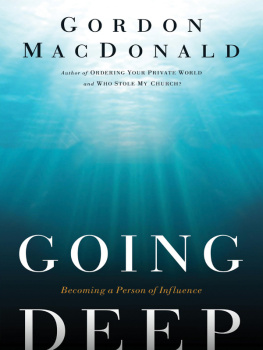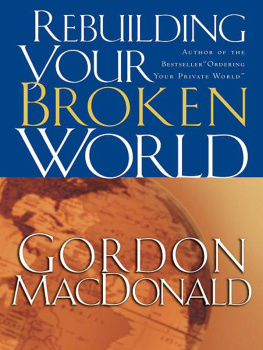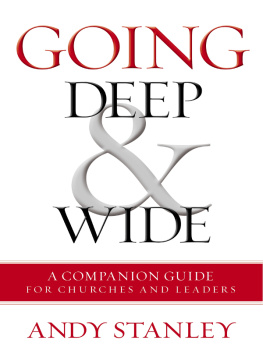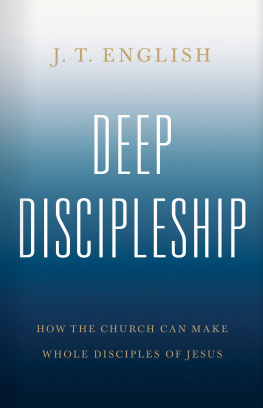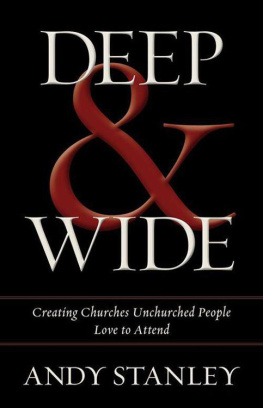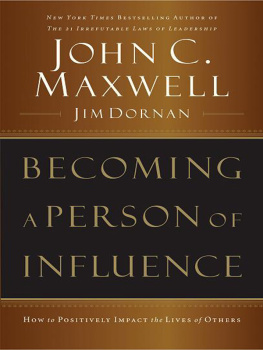
GOING
Becoming a Person of Influence
DEEP
GORDON
MACDONALD

2011 Gordon MacDonald
All rights reserved. No portion of this book may be reproduced, stored in a retrieval system, or transmitted in any form or by any meanselectronic, mechanical, photocopy, recording, scanning, or otherexcept for brief quotations in critical reviews or articles, without the prior written permission of the publisher.
Published in Nashville, Tennessee, by Thomas Nelson. Thomas Nelson is a registered trademark of Thomas Nelson, Inc.
Published in association with the literary agency of Wolgemuth & Associates, Inc.
Thomas Nelson, Inc., titles may be purchased in bulk for educational, business, fundraising, or sales promotional use. For information, please e-mail SpecialMarkets@ThomasNelson.com.
All Scripture quotations are taken from the Holy Bible, New International Version, NIV. 1973, 1978, 1984, 2011 by Biblica, Inc. Used by permission of Zondervan. All rights reserved worldwide. www.zondervan.com
Library of Congress Cataloging-in-Publication Data
MacDonald, Gordon, 1939
Going deep : becoming a person of influence / Gordon MacDonald.
p. cm.
Includes bibliographical references.
ISBN 978-0-7852-2608-6 (trade paper)
1. Spirituality. 2. Spiritual formation. 3. Spiritual lifeChristianity. I. Title.
BV4501.3.M2285 2011
248.4dc23
2011019147
Printed in the United States of America
11 12 13 14 15 QG 5 4 3 2 1
The desperate need today is not for a greater number of intelligent people, or gifted people, but for deep people.
Richard Foster
Disciples [deep people] are not manufactured wholesale. They are produced one by one, because someone has taken the pains to discipline, to instruct and enlighten, to nurture and train one that is younger.
Oswald Sanders
CONTENTS
MANY YEARS AGO I WAS INVITED TO DELIVER A SUNDAY morning sermon in the Cadet Chapel at the United States Military Academy at West Point, New York. I have no idea whether my visit to the Academy that weekend made a difference in anyones life. But I do know that being there made an enormous difference in mine.
This is what I saw: young men and women who knew how to present themselves with dignity and excellence. Officers-in-the-making who were inquisitive, thoughtful, and focused. Budding leaders who were being prepared to go anywhere in the world and swing into influential action the minute they arrived.
The mission of the US Military Academy is: To educate, train, and inspire the Corps of Cadets so that each graduate is a commissioned leader of character committed to the values of Duty, Honor, Country and prepared for a career of professional excellence and service to the Nation as an officer in the United States Army.
My visit to West Point provoked me with a nagging question. What would happen if the church I served became committed to a high-priority leadership training effort that took its inspiration from the mission of West Point?
More than a few seminaries, colleges, and some churches claim to be doing this. They have my applause. Nevertheless, Christians in general do seem to be strugglingat church level anywayto figure out how to produce men and women who fit the biblical standard of spiritual maturity and who know how to inspire others to be faithful to Jesus.
Across the world the Christian movement is going through changes in form and substance that someday may be compared to the changes in the times of Martin Luther or John and Charles Wesley. I dont think I am overly enthusiastic when I say that the church twenty years from now will probably conduct itself and its work in ways that we can hardly imagine today.
It is probable that in these next two decades Christiansin the West, anywaywill have to ready themselves for times we have never seen or experienced before. Suffering, public opposition to faith-based convictions, and pressure in the form of governmental regulation come to mind.
We have just a few hints as to how technology will change the way new generations think and connect. We can only guess at the coming effects of globalization and the ascendant influence of nations like China, India, and others. We are already in the historic white water of a world dealing with seemingly insurmountable problems such as debt, climate-energy issues, and burgeoning populations of young, unemployed, very angry people.
Lest I seem gloomy, can I remind you of the seminar Jesus offered his disciples just before he went to the cross? He described to them a world, not unlike ours, that was falling apart, and he appeared to be saying, The good news amid all this, gentlemen, is that youre going to get to plant a new movement in the middle of this mess. So be wise, alert, faithful, and productive.
Mindful of such tumultuous days ahead, Jesus spent the majority of his time training a small group of men whose message to the world would go viral. If Jesus had followed the ministry strategy that prevails today, he would have spent all of his time preaching. But apart from a few public appearances here and there, Jesus chose to train people. At first he didnt seem to be getting anywhere with his picked ones. Then one day their maturity quotient went through the ceiling.
The takeaway? Great training has exponential results. For those many, many months, the Lords disciples watched him, listened to him, tried to emulate him with marginal results. Then, overnight, they seemed to get it. The word, the gospel, the message of Jesus, the power of the Holy Spirit finally reached the cores of their souls, and they became changed, powerful apostles.
I imagine something like this happens at West Point. When upper-teen boys or girls come to the Military Academy with petty immaturities, you might wonder about their selection. But, one day, they get it: what upperclassmen have been beating into them, what instructors have been teaching them, what it means to be a part of a great military tradition. And thats when you see what I saw that weekend: soon-to-be-commissioned leaders of character, prepared to serve the nation as officers in the United States Army.
IN THE COURSE OF THIS BOOK I WILL TRY TO EXPRESS THE idea that leadership (a word that romances all of us) is first about character, then about a disciplined charisma and competence. In other words, reshape the spiritual parts of a person, as Jesus did, and a forceful but humble kind of leadership begins to emerge from within.
This seems to have been the way of Moses, for example. If all one needed in order to be a leader was passion, education, and connection, then Moses had it all at the age of forty. Yet the first time out of the box, he failed miserably.
But forty years later, after much soul-scouring in the desert, Moses was a new man. He led less from competency and more from the soul. Watch as he backs down the Egyptian pharaoh, leads a crowd of ex-slaves out of Egypt, and introduces them to the God of Abraham. This is a different man from the one we saw when he was forty.
And how is eighty-year-old Moses different? Hes now a deep person, purposely cultivated by God through direct encounter, through difficult circumstances (humiliation, failure), and through mentoring by resourceful people. Note my use of two significant wordsdeep and cultivatedbecause, from here on out, they will appear again and again in this book. They are what this book is about.
It is admittedly a big leap from the Moses of ancient days to our time. But one might wonder if the present Christian movement, as many of us know it, is capable of cultivating Moses-rated leaders.
Next page
